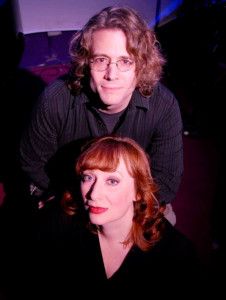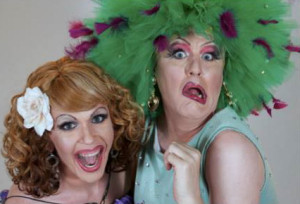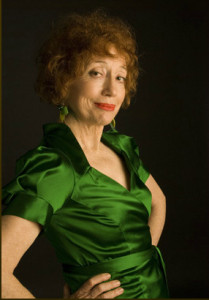A Few Shows and a Pet Peeve
This is my first Bistro Bits column since June 11, 1999. I trust you’ll forgive the slight interruption. In this return column, I discuss a few shows I’ve seen in the intervening years—more precisely, during the past few months. And I comment on a lamentable practice that has become almost as commonplace as it is misguided.
I first saw Ted Stafford and Lorinda Lisitza perform as a duo at a Metropolitan Room staff show a few years ago. I found them breezy and charming together and their work fresh and musically solid. Sometime later, they came back on the scene with the full-length The Ted & Lo Show, an evening of covers and a few original songs. (They both sing, he plays guitar, and from time to time she accompanies on the harmonica.) Though the show was a wee bit rough in spots, it was very entertaining, and their talent—individually and as a pair—was impressive. I saw it twice and enjoyed it both times.
With the current, second edition of The Ted & Lo Show, entitled “This May Hurt a Bit,” their work has matured: their harmonies and arrangements are richer, the programming is stronger, and their performance is more polished. A fair number of the selections are dark—for example a pairing of Stevie Wonder and Yvonne Wright’s “Evil” and Sufjan Stevens’s “John Wayne Gacy, Jr.” Stafford is such a cheerful and affable fellow, yet his original songs tend to be the very opposite of sunny, such as his “Cold-Blooded,” a bleak song of masochistic abnegation. The songs he co-wrote with Lisitza are somewhat less dark, but no less dramatic, such as the show’s title song, which presents a woman who is frustrated and anguished by her lover’s passivity.
You might think that all this darkness and drama would make for a dreary hour, but on the contrary, the evening is thoroughly satisfying and rewarding. The reason is that the performances are authoritative, the expressive arrangements add texture and coloration, and these songs are not only strong, they are also interesting. What’s more, Stafford and Lisitza have not left their humor and impish personalities behind—we get, for example, the playful comments they insert in Lennon and McCartney’s “When I’m Sixty-Four” and at the show I saw, Jeff Moss’s “Rubber Duckie,” quite possibly the least dark song ever written.
They’ve been appearing more or less monthly at Don’t Tell Mama; their next performances are scheduled for May 2 and 28.
They had me with the title. Well, almost. I thought the show would be either smart and irreverent or dumb and adolescent. Happily, it’s the former, not the latter. And it’s hilarious. This two-character free-wheeling revue gives us Lady Winifred (Dewey Chaffee) and Miss Didi Panache (Douglas Edwards) They take audience questions, Didi sings a couple of songs, they call people from the audience onto the stage—perhaps to participate in a wacky quiz—and, in general, they hold forth and carry on. The premise is that Lady Winifred had years before suffered a stroke that left her unable to censor or edit what she says—her inner voice has become her outer voice. This gives her license to come out with the most outrageous and politically incorrect utterances you’re likely to hear—there isn’t a minority or nationality that is safe from her tongue.
This is edgy stuff, but rather than being offensive, it punctures prejudice and small-mindedness by holding them up to ridicule. I don’t think these two characters have a bigoted bone in their sequined bodies. The evening is structured, but mainly unscripted; what they say will depend on the interaction with the audience. Which means that they have to be quick-witted—and are they ever! It is clear that they are extremely bright and very well informed. Someone who’d been sitting behind me the first time I saw “The Screw You Revue” commented that she had never seen me laugh out loud so much at a show. She may have been right.
Didi and Lady Winifred now appear at The Duplex twice a month. Their next shows are April 12 and 26.
Late last year at The Duplex, Zachary Wobensmith made his New York solo cabaret debut with his excellent show “Stiff Upper Lip: Songs of the Brits,” a program of the works of Noël Coward and Ivor Novello. His baritone has an attractively bright resonance, and without overdoing the accent or style, he performed with a perfect sense of Britishness. These two songwriters were able to express strong feelings with elegance and reserve, and Wobensmith’s interpretations did the same, and his patter was intelligent and informative.
He introduced a pairing of Coward’s “Someday I’ll Find You” and “I’ll See You Again” by describing them as waltzes that transcend Viennese tradition and become uniquely British in character; his rendition of the songs was quite touching. In contrast, Novello’s “Waltz of My Heart” was more Viennese‑y, and Wobensmith and musical director Matthew Martin Ward at the piano gave it a sweeping performance. Wobensmith turned in delightful renditions of two Coward comic gems, “Don’t Let’s Be Beastly to the Germans” and “That Is the End of the News.” (He didn’t fare quite as well on “Nina,” but he might have been thrown because he’d neglected to sing it at the planned spot in the show and did it a bit later, when Ward reminded him of the omission.)
Two songs that pay homage to London provided an interesting comparison between the way the songwriters approached the task. Coward’s “London Pride” is the most moving tribute to a city that I know of, and Wobensmith’s heartfelt performance had me in tears. By contrast, Novello’s “Rose of England” is majestic, heroic—stirring, perhaps, but without an emotional tug. The only serious disappointment of the evening was Wobensmith’s handling of Coward’s “If Love Were All”: the song, of course, was written for a woman, and he changed genders inconsistently and unwisely—he should have sung the lyric exactly as written; further, he needed to dig a bit deeper into this bittersweet song.
I hope that Wobensmith has the occasion to bring this show back—it deserves to be enjoyed by more people. I, for one, would love to see it again.
New Zealander Linn Lorkin came to Don’t Tell Mama a few months ago with “Hey, Piano Bar Lady!,” which she characterizes as a jazz musical. Written by her and directed by Collette Black, the show recounts, through dialogue and original songs, Lorkin’s experiences working as a singer-pianist in New York City from 1977 to 1985. She’s enchanting, a natural story-teller. Her anecdotes (about finding a place to live, looking for gigs, the people she met, the people she fell in love with, the things that happened to and around her) are endlessly amusing and engrossing, and her songs complement the tale and the telling marvelously. She’s a delightful person to spend 90 minutes with. I went knowing nothing about her; I left regretting that she was going back to New Zealand.
Autobiographical patter
Next to the malaise of gratuitous melisma, the misguided use of autobiographical patter is probably my second-greatest peeve. I’ve written about this a few times in the past, and I thought the practice had diminished, but I recently saw three shows in a two-week period that not only included autobiographical patter, but used it as the very framework of the show.
This practice probably stems, in part, from the notion that because cabaret is a very personal medium, it is necessary, or at least desirable, to tell the audience about yourself. Wrong, wrong, wrong! Why should strangers in the audience give a damn about you? They’re there to be entertained, moved, delighted, etc. They did not come because they wanted to get to know you. Another probable explanation of why this approach is taken is that it is easy to take a bunch of anecdotes from your personal life and interleave them with songs. Easy it may be, but it smacks of unprofessionalism: it assumes, perhaps unconsciously, that a cabaret is an informal get-together, attended only by your friends and family.
Several years ago, a friend, who was visiting me from Berlin, and I went to a cabaret show. After the performance, I asked her whether she’d liked the singer. My friend responded with a question: “Why did she tell us about her grandfather.” You see, my friend was a “normal” audience member—not a friend or relative of the singer, and not someone who’d been exposed to the crappy advice that performers must tell us about themselves. My friend is your target audience—unless you expect the audience to comprise only friends and family and you wish to remain an amateur.
Now to the three shows I referred to at the beginning of this discussion. In one, the singer regaled us with incidents from his life and with his personal view of what is important; in another, the singer told us about her childhood relationships with her father and other family members; in the third, the singer recalled his movie-going experiences growing up in a small town out west. While some of this patter did a fair job of setting up the next song, the point is that there was nothing remarkable or especially interesting about these trips down memory lane. And it’s not that the performers lacked charm—some of their patter might have made agreeable, though not necessarily stimulating or even very interesting, dinner table conversation. (On the other hand, some of it would have made me eager to ask the waiter for the check and leave.) But time on stage is precious; what might be good enough for a casual chat isn’t good enough. Most of this patter wasted this precious time. Actually, it did worse than that: it set my teeth on edge. I was like my friend from Berlin, except that I wasn’t perplexed, I was annoyed. (Note that I am not commenting here on the musical performances in those shows; there was a fair amount of good work done in that department.)
It’s not that one may never include autobiographical patter. As I stated in an earlier piece: “In general, autobiographical patter should have at least one of the following attributes: (1) it is insightful, making observations that have resonance beyond your own life and experience [i.e., it is interesting]; (2) it is uncommonly well phrased and, so, qualifies as spoken literature; (3) it is funny.” The patter in the three shows in question lacked all of these qualities.
You may be thinking, “But earlier in this column you praised Linn Lorkin’s show, and it was autobiographical!” Yes I did. For one thing, her dialogue painted a picture of a part of New York’s nightlife scene in the late ’70s-early ’80—so, though it was based on her experiences, it had greater resonance. In addition, it was very well written, and she was very funny. She met all three criteria. Or take Billie Roe’s Tom Waits show, in which she wove Waits’s songs with stories about her first year in New York, 1978. Her dialogue, mainly about characters that she encountered then, was always interesting, and like Lorkin’s show, it painted a picture of a place and time. What’s more, Roe is a superb writer, and her anecdotes were, indeed, spoken literature—story-telling at the highest level.
Today, I received a release from Justin Daniel about the show he’ll be doing at The Duplex later this month: quoting from the release, the show “chronicles the unfolding and often bizarre road towards gay fatherhood.” I can’t judge the show until I’ve seen it, but the subject matter certainly has considerable potential for having resonance beyond his own experiences—it also has the potential for being funny, if that’s the tack he’s opted to take. Getting back to the shows that triggered this commentary, patter about family relationships could be interesting if it made insightful observations about the nature of families, etc.; telling about early movie-going experiences could be fine if the dialogue centered around an informative analysis of films of that period.
One final anecdote. At the Salon open mic a few weeks ago, Natasha Castillo, who at the time was doing a show about the Carpenters, sang a Carpenters song. The co-host of the evening asked her what had gotten her interested in the Carpenters, then added, “I’m sure you tell us that in your show.” She replied, “Oh, no, I don’t. The show isn’t about me, it’s about the Carpenters.” I could have stood up and cheered. People in the audience don’t care why a singer chose to do a particular song, or what the song means to the singer. Rather, the singer’s job is to make the audience glad that he or she made that choice.
If you wish to read a fuller discussion of this subject, I encourage—no, I beseech you to click here to see an article I wrote for the MAC web site.
About the Author
Roy Sander has been covering cabaret and theatre for over thirty years. He’s written cabaret and theatre reviews, features, and commentary for seven print publications, most notably Back Stage, and for CitySearch on the Internet. He covered cabaret monthly on “New York Theatre Review” on PBS TV, and cabaret and theatre weekly on WLIM-FM radio. He was twice a guest instructor at the London School of Musical Theatre. A critic for BistroAwards.com, he is also the site’s Reviews Editor; in addition, he is Chairman of the Advisory Board of MAC.









Thank you for your very helpful commentary about your reviews and pet peeves of cabaret singers in particular the ever personal and domestic and gratuitous political commentary especially to someone such as I who am not well versed in cabaret performance and technique. Your comments underscore the artistry of cabaret which often gets lost in the detritus of the “talk”. I realize cabaret can be more compelling than I had given it credit.